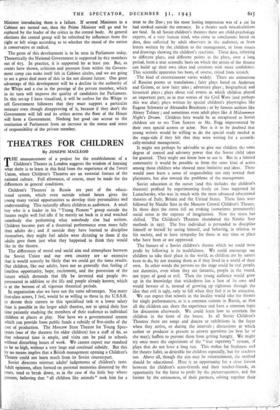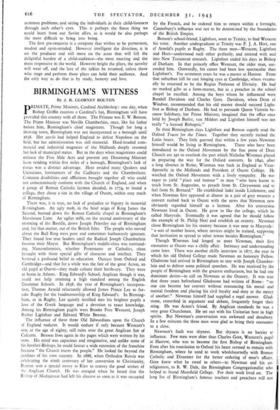THEATRES FOR CHILDREN
By JOSEPH MACLEOD THE announcement of a project for the establishment of a Children's Theatre in London suggests the wisdom of learning what there is to learn in this field from the experience of the Soviet Union, where Children's Theatres are an essential feature of the national culture. Full allowance, of course, must be made for the differences in general conditions.
Children's Theatres. in Russia are part of the educa- tional system, which even outside school hours gives the young many varied opportunities to develop their personalities and understanding. This naturally affects children as audiences. A small boy who is a leader in his " Young Pioneer " group outside the theatre might well feel idle if he merely sat back in it and watched somebody else performing what somebody else had written. Children become part of a theatrical performance even more fully than adults do ; and if outside they have learned to discipline themselves, they might feel adults were dictating to them if the adults gave them just what they happened to think they would like in the theatre.
The differences of moral and social aim and atmosphere between the Soviet Union and our own country are so extensive that it would scarcely be likely that we could get the same results. Our children, like our adults, have not so generally that feeling of limitless oppcktunity, hope, excitement, and the possession of the future which demands that life be invented and people im- personated in addition to the life and people already known, which is at the bottom of all vigorous theatrical periods.
In organisation also we have not the same advantages. Not many first-class actors, I feel, would be as willing as those in the U.S.S.R. to devote their careers to this specialised task at a lower salary than is possible in the larger adult theatres, nor to spend their free time patiently studying the members of their audience as individual children at places at play. Nor have we a governmental system which can provide from public funds a subsidy of five-sixths of the cost of production. The Moscow State Theatre for Young Spec-, tators (one of the theatres for older children) has a staff of 6o, so that rehearsal time is ample, and visits can be paid to schools without disturbing hours of work. We cannot expect our standard to be so high, without a very large and continual subsidy. But this by no means implies that a British management opening a Children's Theatre could not learn much from its Soviet counterpart.
Soviet directors mistrust adults' judgements of children's taste. Adult opinions, often formed on personal memories distorted by the Years, tend to break down, as in the case of the little boy whose parents, believing that " all children like animals" took him for a treat to the Zoo ; yet his most lasting impression was of a cat he had stroked outside the entrance. In a theatre such miscalculations are fatal. In all Soviet children's theatres there are child-psychology experts, of a very human kind, who come to conclusions based on data, data collected by adult observers in the audience, or from letters written by the children to the management, or from essays and drawings showing the children's reactions. These data, referring to different plays, and different points in the plays, over a long period, form a true scientific basis on which the artists of the theatre can build up their own ideas and creations with more confidence. This scientific apparatus has been, of course, raised from scratch.
- The kind of entertainment varies widely. There are animations of Russian poems or translations ; fairy plays based on Andersen and Grimm, or new fairy tales ; adventure plays ; biographical and historical plays ; plays about real events in which children played an important part; as in true stories of the Civil Wars (and perhaps this war also); plays written by special children's playwrights like Eugene Schwartz or Alexandra Brushtein ; or by famous authors like Alexey Tolstoy ; and sometimes even adult plays like A Midsummer Night's Dream. Children here would be as enraptured as Soviet children are to see Tom Sawyer or Mr. Fogg impersonated by their own special actress or actor. Nor is it to be doubted that young writers would be willing to do the special study needed at the stage-side if they felt that they were writing for a scientifi4 tally-minded management.
It might not perhaps be advisable to give our children the same degree of control and advisory power that the Soviet child takes for granted. They might not know how to use it. But in a limited community it would be possible to form the same kind of activs . among those children who showed most initiative and ideas. These would soon learn a sense of responsibility not only toward their playmates, but also toward the problems of the management.
Soviet education at the outset (and this includes the children's theatres) profited by experimenting freely on lines suggested by Lunacharsky, who was in touch with the most advanced educational theories of Italy, Britain and the United States. These lines were followed by Natalie Satz in the Moscow Central Children's Theatre. In those days the stress fell on evoking (sometimes prematurely) social sense at the expense of imagination. Now the stress has shifted. The Children's Theatres abandoned the Natalie Satz methods in 1937. The free individual is persuaded to discipline himself or herself by seeing himself, and behaving, in relation to his society, and to have sympathy for those at any time or place who have been or are oppressed.
The feature of a Soviet children's theatre which we could most profit by following is its truthfulness. We could encourage our children to take their place in the world, as children are by nature keen to do, by not treating them as if they lived in a world of their own. In other words the persons on the stage could be real people, not dummies, even when they are fantastic, people in the round, not types of good or evil. Then the young audience would grow up in the knowledge that wickedness has a lure of its own and would beware of it, instead of growing up righteous through the idea that evil is ugly, only to fall when they feel it to be attractive.
We can expect that schools in the locality would take the theatre for single performances, as is a common custom in Russia, so that all the children can share the experience and have a common topic for discussion afterwards. We could learn how to entertain the children in the front of the house. In all Soviet Children's Theatres there are songs and dances or exhibitions in the foyer when they arrive, or during the intervals ; discussions at which author or producer is present to answer questions (as best he or she may); buffets to prevent them from getting hungry. We might try once more the experiment of the " true repertory " system, of plays that do not have a long run. This makes for freshness and the theatre habit, so desirable for children especially, but for teachers too. Above all, though the aim may be entertainment, the method should be educational. Here is an opportunity for a close liaison between the children's actor-friends and their teacher-friends, an opportunity for the latter to profit by the picturesqueness, and the former by the seriousness, of their partners, solving together their common problems, and seeing the individuals in their child-listeners through each other's eyes. This is perhaps the finest thing we could learn from our Soviet allies, as it would be also perhaps the most difficult to bring into being.
The first pre-requisite is a company that wishes to be permanent, modest and open-minded. However intelligent the direction, it is on the producer and still more on the actor that will fall the delightful burden df a child-audience—the most exacting and the most responsive in the world. However bright the plays, the novelty will wear off, and the lure of the talkies be resumed, unless those who stage and perform those plays can hold their audience. And the only way to do that is by study, honesty and love.































 Previous page
Previous page